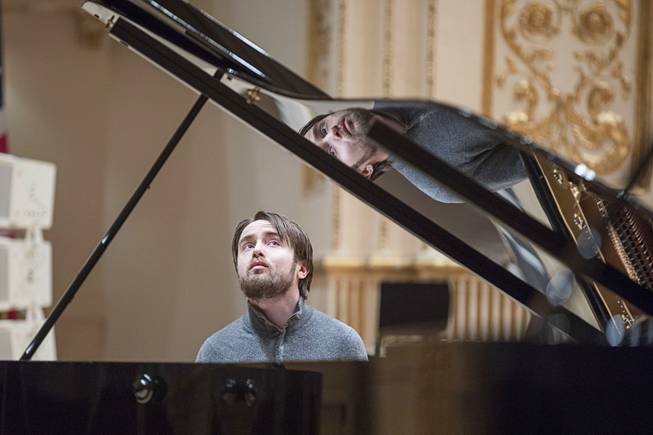
Sara Krulwich / The New York Times
Daniil Trifonov, one of the most in-demand pianists of the new generation, practices on a piano he chose after trying out two Carnegie Hall in New York, Dec. 25, 2016. The kind of stamina that Trifonov relies on to get through a touring career is that of physical endurance and mental focus.
Saturday, Dec. 10, 2016 | 1:30 a.m.
NEW YORK — Even with his astonishing technique, Russian pianist Daniil Trifonov looked as if he needed all his youthful energy to get through his formidable recital program at Carnegie Hall on Wednesday. During the fiendishly difficult final work, Stravinsky’s Three Movements From “Petrouchka,” there were fleeting moments when the slender, boyish Trifonov, 25, threw his arms so forcefully into pummeling fortissimo chords that his body lifted maybe 6 inches off the piano bench.
But there is another kind of stamina involved in a touring career, especially when you are, like Trifonov, one of the most in-demand pianists of the new generation: the stamina of physical endurance and mental focus.
I observed some of his arduous preparation for this recital Monday afternoon, when he tried out pianos at Carnegie Hall (eventually picking a German-made Steinway) and practiced for a couple of hours. He had just arrived from California, where, on Sunday afternoon, he played the last of four performances of Rachmaninoff’s daunting Third Piano Concerto with the Los Angeles Philharmonic. On Sunday night, he took a red-eye flight to New York, arriving Monday morning at the Battery Park City apartment he shares with his fiancée, who works in publishing.
He had Carnegie to himself for two hours in the afternoon. After going through his program — works by Schumann and Shostakovich, in addition to the Stravinsky — he sat for an interview with me a block away at Petrossian Cafe, where he ordered a salad (no dressing) and ate only half. Then he took the subway to his apartment to get in more practice before meeting Sergei Babayan, his former teacher, at the Juilliard School for an evening coaching session.
That’s what you call a work-filled 36 hours.
But Trifonov told me he was planning to cut back his performing schedule, not just to have more leisure but also to resume his other love: composing. “I have several projects now which are on hold,” he said. Last month, he played his own piano concerto with the Kansas City Symphony. He is writing a double concerto for violin and piano, joined by strings, that he will play with the violinist Gidon Kremer and the Kremerata Baltica chamber orchestra. (Last season, he and Kremer gave a splendid duo recital at Carnegie Hall.)
During his practice session at Carnegie, Trifonov sometimes stopped to rotate his shoulders and loosen up. He usually takes more care to do stretching and yoga, but this afternoon he felt, he said, “hunched from excessive sitting” on his flight. He also finds swimming beneficial. “I actually practice in the swimming pool,” he said. “The resistance helps to release the upper arms.”
It was especially fascinating to watch him practice Schumann’s suite “Kreisleriana,” a teeming 30-minute masterpiece. Trifonov would repeat a rhapsodic flight in the music — not to nail it technically, it seemed clear, but rather to highlight inner voices or bring out a certain milky coloring as harmonies mingled, what he later described as paying “attention to resolutions,” “the way sounds connect.”
Playing through the “Russian Dance” movement from Stravinsky’s “Petrouchka,” which begins with a giddy riot of propulsive parallel chords for both hands, Trifonov kept repeating passages, even though they sounded flawless. He explained later that he was trying to keep these steely chords crisp and light, demonstrating by playing the passage on the tabletop at the cafe.
Those chords sure sounded crisp and light during the sold-out recital. Before the Stravinsky, he gave somberly compelling accounts of five of Shostakovich’s set of 24 Preludes and Fugues, a monumental work inspired by Bach. Trifonov said it took him a whole summer to learn these mercurial, complex pieces. Most pianists would say learning, and memorizing, Shostakovich’s enormous score in a single summer seems quick work.
He began the recital with Schumann’s tender “Scenes of Childhood” suite, played with delicacy and poetic refinement. At times his sound was almost too intimate for a hall the size of Carnegie, though the subtleties of the performance come though vividly on the medici.tv video, which was broadcast live; a recording is available on the site for three more months.
Trifonov the young conqueror of the keyboard revealed himself with a breathless account of Schumann’s joyous Toccata, a notorious finger-twister. The brilliant and poetic components of his artistry found ideal balance in his magnificent performance of “Kreisleriana.”
After two encores by Russian composer Nikolai Medtner, Trifonov closed the keyboard’s lid to indicate that he had played his last piece. Many fans then went to a lounge area, where Trifonov signed copies of “Transcendental,” his stunning recent recording of Liszt’s complete études.
It took five grueling days to record this two-disc set. For a week afterward, he told me, “I couldn’t practice at all.”
I don’t wonder.

Join the Discussion:
Check this out for a full explanation of our conversion to the LiveFyre commenting system and instructions on how to sign up for an account.
Full comments policy